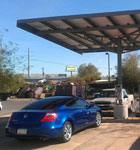WESCO Distribution, the publicly traded, Fortune 500 distributor of electrical, data communications, and industrial products first entered the sustainability arena by promoting the green products of its suppliers. The Pittsburgh, Pennsylvania-based company became a fixture at green trade shows, and their encounters with customers made it clear that the company should also begin focusing on strategies to minimize its own environmental impact.
After a comprehensive environmental inventory in 2009, WESCO developed a program to reduce its energy use, fuel use, and waste. The first step in this program was to focus on greening more than 350 WESCO facilities across the country.

“Sustainability is a core responsibility and strategic priority at WESCO,” says president and CEO John Engel. “We are taking a leadership role in our industry by working with our suppliers.”
“Sustainability is a core responsibility and strategic priority at WESCO,” says John Engel, president and CEO. “We are taking a leadership role in our industry by working with our suppliers in providing cost-effective, environmentally friendly products and solutions to our customers.”
Energy efficiency has emerged at the forefront. Through retrofits at just 50 of WESCO’s owned properties, the company will reduce its carbon footprint by nearly five percent and save nearly $500,000 in annual energy costs in 2012.
The company is leveraging relationships with vendors like Cooper, Eaton, Philips, and Lutron to incorporate energy-efficient products in its facilities and showcase the effectiveness of those products.
Because WESCO leases around 75 percent of its facilities, the organization also has developed a policy for building energy efficiency into those leases. “We have an industry-leading green lease policy,” says Billy Grayson, director of corporate sustainability, explaining that landlords must be able to demonstrate certain efficiency levels and meet minimum HVAC, lighting, and building-controls performance standards.
Case in point: WESCO worked with the landlord of a facility in Charlotte, North Carolina, to secure LEED-NC Gold status, making it the first such designated warehouse building in the city. Ninety percent of the Charlotte facility’s equipment is designated for high efficiency by Energy Star. Motion sensors turn off lights when they’re not needed. And more projects of this sort are in store for WESCO.

WESCO’s Charlotte location is LEED Gold certified.
“As we continue to renovate, we continue to identify new opportunities for LEED certification,” Grayson says, noting that the company also pursues Energy Star status in its facilities. The renovation of WESCO’s Pittsburgh headquarters, for instance, is working to earn points towards LEED certification under the Commercial Interiors rating.
Plans for that effort include upgrading lighting from T-12 to T-8 fluorescents and installing motion sensors in conference rooms, break rooms, private offices, and bathrooms. WESCO has increased the amount of natural light available to employees in interior spaces, which dovetails with the company’s employee-wellness initiatives.
WESCO’s heterogeneous portfolio allows it to pursue unique and innovative eco-friendly solutions suitable to each specific property. In Phoenix, WESCO installed a solar-powered electric-car-charging station, a reflection of the organization’s increasing attention to renewable energy resources. WESCO also has given some attention to improving the performance of its own 550-vehicle fleet, which handles about half of the company’s shipping, through the use of speed governors.
Of course, WESCO continues to develop green products for its customers too. “We’re helping customers find product solutions to reduce their environmental impact,” Grayson says. One such product is the MaxCell Innerduct, a pathway for fiber-optic cables that reduces lifecycle carbon emissions by more than 85 percent over its closest competitor by using fewer materials, less fuel for shipping, and less energy for installation. It seems that WESCO now can point to several case studies, both internal and external, as evidence of practicing the sustainability that it preaches.

